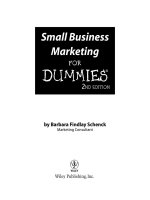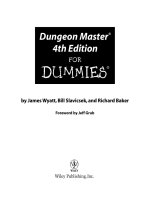Macroeconomics for dummies UK
Bạn đang xem bản rút gọn của tài liệu. Xem và tải ngay bản đầy đủ của tài liệu tại đây (6.05 MB, 372 trang )
MacroeconomicsForDummies®,UKEdition
Publishedby:JohnWiley&Sons,Ltd.,TheAtrium,SouthernGate,
Chichester,www.wiley.com
Thiseditionfirstpublished2015
©2016JohnWiley&Sons,Ltd,Chichester,WestSussex.
Registeredoffice
JohnWiley&SonsLtd,TheAtrium,SouthernGate,Chichester,WestSussex,
PO198SQ,UnitedKingdom
Fordetailsofourglobaleditorialoffices,forcustomerservicesandfor
informationabouthowtoapplyforpermissiontoreusethecopyrightmaterial
inthisbookpleaseseeourwebsiteatwww.wiley.com.
Allrightsreserved.Nopartofthispublicationmaybereproduced,storedina
retrievalsystem,ortransmitted,inanyformorbyanymeans,electronic,
mechanical,photocopying,recordingorotherwise,exceptaspermittedbythe
UKCopyright,DesignsandPatentsAct1988,withoutthepriorpermissionof
thepublisher.
Wileypublishesinavarietyofprintandelectronicformatsandbyprint-ondemand.Somematerialincludedwithstandardprintversionsofthisbookmay
notbeincludedine-booksorinprint-on-demand.Ifthisbookreferstomedia
suchasaCDorDVDthatisnotincludedintheversionyoupurchased,you
maydownloadthismaterialat.Formore
informationaboutWileyproducts,visitwww.wiley.com.
Designationsusedbycompaniestodistinguishtheirproductsareoftenclaimed
astrademarks.Allbrandnamesandproductnamesusedinthisbookaretrade
names,servicemarks,trademarksorregisteredtrademarksoftheirrespective
owners.Thepublisherisnotassociatedwithanyproductorvendormentioned
inthisbook.
LIMITOFLIABILITY/DISCLAIMEROFWARRANTY:WHILETHE
PUBLISHERANDAUTHORHAVEUSEDTHEIRBESTEFFORTSIN
PREPARINGTHISBOOK,THEYMAKENOREPRESENTATIONS
ORWARRANTIESWITHTHERESPECTTOTHEACCURACYOR
COMPLETENESSOFTHECONTENTSOFTHISBOOKAND
SPECIFICALLYDISCLAIMANYIMPLIEDWARRANTIESOF
MERCHANTABILITYORFITNESSFORAPARTICULARPURPOSE.
ITISSOLDONTHEUNDERSTANDINGTHATTHEPUBLISHERIS
NOTENGAGEDINRENDERINGPROFESSIONALSERVICESAND
NEITHERTHEPUBLISHERNORTHEAUTHORSHALLBELIABLE
FORDAMAGESARISINGHEREFROM.IFPROFESSIONALADVICE
OROTHEREXPERTASSISTANCEISREQUIRED,THESERVICES
OFACOMPETENTPROFESSIONALSHOULDBESOUGHT.
Forgeneralinformationonourotherproductsandservices,pleasecontactour
CustomerCareDepartmentwithintheU.S.at877-762-2974,outsidetheU.S.
at(001)317-572-3993,orfax317-572-4002.Fortechnicalsupport,please
visitwww.wiley.com/techsupport.
LibraryofCongressControlNumber:2015950120
ISBN978-1-119-02662-4(paperback);ISBN978-1-119-02667-9(ebk);ISBN
978-1-119-02668-6(ebk)
MacroeconomicsForDummies®
Visit
www.dummies.com/cheatsheet/macroeconomicsukto
viewthisbook'scheatsheet.
TableofContents
Cover
Introduction
AboutThisBook
FoolishAssumptions
IconsUsedinThisBook
BeyondtheBook
WheretoGofromHere
PartI:GettingStartedwithMacroeconomics
Chapter1:DiscoveringWhyMacroeconomicsIsa
BigDeal
TheBigPicture:CheckingOuttheEconomyasaWhole
LookingattheKeyMacroeconomicVariables
ModellingtheEconomy
PlottingEconomicPolicy
FinancialCrises!GoingWrongonaGlobalScale
Chapter2:LookingatKeyQuestionsand
Concepts
SeeingtheQuestionsthatIntrigueMacroeconomists
ThinkingLikeanEconomist:LearningtoLoveModelling
ClarifyingImportantMacroeconomicConcepts
Chapter3:CuringaSickEconomyofFour
Afflictions
ReadingaboutRecessions
GettingHyperaboutHighInflation
FindingOutaboutFinancialCrises
UncoveringUnemployment:CausesandResponses
PartII:MeasuringtheThingsthatMatter
Chapter4:TottingupaCountry’sEconomic
Activity:GrossDomesticProduct
GraspingtheIdeaofGDP
GettingOutWhatYou(Marginally)PutIn
CalculatingGDP:AssessinganEconomy’sHealth
MeasuringLivingStandardswithGDPandOtherMethods
Chapter5:FacingtheFactofIncreasingPrices:
Inflation
WorkingOutInflation:LookingintotheAverageShoppingBasket
ExaminingtheCauseofInflation:TheQuantityTheoryofMoney
AppraisingInflation:GoodorBad?
RisingtoExtremes:Hyperinflation
GoingDownwards:Deflation
Chapter6:Unemployment:WastingTalentand
Productivity
UnderstandingtheImportanceofUnemployment:Opportunity
Cost
ComparingTwoDifferentMeasuresofUnemployment
DistinguishingTwoDifferentTypesofUnemployment
Reducingthe‘Natural’RateofUnemployment
PartIII:BuildingaModeloftheEconomy
Chapter7:WorkingOutaCountry’sEconomic
Demand
LookingintoWhatEveryoneWants:AggregateDemand
MeetingtheComponentsofAggregateDemand
FollowingtheAggregateDemandCurve
Chapter8:DeterminingHowMuchStuffan
EconomyCanProduce
ProducingWhatPeopleDemand:AggregateSupply
LookingatLong-RunAggregateSupply
GettingtoGripswithShort-RunAggregateSupply
Chapter9:UsingtheAD–ASModeltoAnalyse
ShockstotheSystem
DiscoveringWhattheAD–ASModelDoesandDoesn’tExplain
DelvingintoDemand-SideShocks
BumpingintoSupply-SideShocks
PartIV:ExaminingMacroeconomicPolicy
Chapter10:UsingMonetaryPolicytoInfluencethe
Economy
SeeingMonetaryPolicyinAction
ExertingControloverInflation
SpottingtheLiquidityTrapandQuantitativeEasing
ReelingintheFisherEffect
Chapter11:FiscalPolicy:BalancingtheBooks–
Perhaps
DelvingintoFiscalPolicy
TakinginTwoViewsofFiscalPolicy
Chapter12:SeekingLowUnemploymentandLow
Inflation:ThePhillipsCurve
BoostingtheEconomy:AGoodStrategyforLowUnemployment?
ZeroinginontheShort-andLong-RunPhillipsCurve
TakingActionwithDisinflationPolicy
Chapter13:FollowingRulesorUsingDiscretion:
TwoApproachestoEconomicPolicy
IntroducingtheRulesversusDiscretionDebate
DiscerningtheProblemswithDiscretion
SolvingtheProblem:TyingYourHandsVoluntarily
PartV:UnderstandingtheFinancialCrisis
Chapter14:ConsideringFundamentalWeaknesses
oftheFinancialSystem
UnderstandingWeaknessesintheFinancialSystem
FindingOutaboutFractionalReserveBanking
CatchingaCold!SystemicRisk
Chapter15:GettingAwaywithExcessiveRiskTaking:MoralHazard
BanksBehavingBadly:WatchingOutforMoralHazard
AvoidingFinancialArmageddon:Bailouts
ProvidingIncentivesforExcessiveRisk-Taking
CommittingtoNoBailouts(DreamOn!)
Chapter16:ConsideringtheLessonsofthe2008
FinancialCrisis
DelvingintotheGlobalFinancialCrisis
AskingWhyEconomistsDidn’tPredicttheCrisis
TryingtoStoptheNextCrisis
PartVI:ThePartofTens
Chapter17:GettingtoKnowTenGreat
Macroeconomists
AdamSmith(1723–1790)
JohnMaynardKeynes(1883–1946)
MiltonFriedman(1912–2006)
PaulSamuelson(1915–2009)
RobertSolow(born1924)
RobertLucas(born1937)
EdwardPrescott(born1940)
RobertBarro(born1944)
RobertHall(born1943)
JanetYellen(born1946)
Chapter18:TenTopTipstoTakeAway
FactoringinFactorsofProduction
PayingFactorsofProductionTheirMarginalProducts
UnderstandingthatExcessiveGrowthintheMoneySupply
CausesHighInflation
MinimisingUnemployment(ThoughSomeIsInevitable)
StimulatingAggregateDemandCanIncreaseOutputOnlyinthe
ShortRun
AcceptingthatFinancialCrisesAreCertainandImpossibleto
Predict
SeeingthatNoTrade-OffExistsbetweenInflationand
UnemploymentintheLongRun
DiscoveringWhyPolicyMakersShouldConstrainThemselves
FixingtheFinancialSystemwithoutSolvingMoralHazardIs
Impossible
Recognisingthat,Ultimately,RealThingsAreWhatCount
AbouttheAuthors
CheatSheet
AdvertisementPage
ConnectwithDummies
EndUserLicenseAgreement
Introduction
Macroeconomicsisthestudyoftheeconomyasawhole.Soifyouwantto
understandkeyconceptsthatyoucomeacrosseverydayinthenews,suchas
inflation,unemploymentandeconomicgrowth,thisisthebookforyou!
Thisbookhelpsyoutotacklesomeofthebiggestquestionspeopleaskabout
macroeconomics,suchas
Whyaresomecountriesrichandotherspoor?Andwhatcanpoorcountries
dotobecomericher?
Whatcausesthepricesofthingstoriseandfall?
Whyaresomepeopleunabletofindwork?Andwhatcanbedoneto
reduceunemployment?
Whyistheresomuchinequalityintheworldandwhatcanwedoaboutit?
Wedon’tpretendtohaveanswerstoallthequestions,butwedothinkthat
macroeconomicsprovidessomegoodanswerstomanyquestionsabouthow
theeconomyworks.
Fortunately,someoftheworld’sgreatestmindshaveworkedon
macroeconomicsandcreatedasubstantialbodyofwork.Sadly,economists
(andwe’rejustasguilty)haven’tdoneagreatjobatcommunicatingthekey
ideasofmacroeconomicstothepublic.Asaresult,alltoooftenpoliticians
andcommentatorsareabletobamboozlepeoplewithnice-soundingbut
ultimatelybadeconomics.
Thepointofthisbookistointroduceyoutothefascinatingworldof
macroeconomicssoyoucanseehowtheeconomyworksinreality,howyoufit
intoitand,perhaps,ultimatelyhowtheworldcanbemadeabetterplace.
AboutThisBook
Macroeconomicsaffectsalmosteverypartofyourlife.Whetheryouhaveajob
orareunemployed,whetheryouearnmillionsortheminimumwage,whether
youwanttoborrowmoneyorearnincomefromyoursavings,macroeconomics
matterstoyou.
Inthisbookyoufindthecoremacroeconomicconceptspresentedinaway
that’seasytodigest.Weskipasmuchunnecessarycomplexityaspossible
whilestilltakingarigorousapproachtotheissues.
Youcanusethisbookforreference,flickingstraighttoanychapterthat
interestsyou:readingthebookfromcovertocoverisn’tnecessary.Thatsaid,
ifyou’restudyingamacroeconomicscourseatschooloruniversityyoumay
prefertoreaditsystematically,inwhichcasetakingthechaptersinorder
makessense.
Throughoutthebookyoufindsidebarsthatprovideadditionaldetailabout
differenttopicsofinterest.Wehopethatyoufindtheseuseful,butyoudon’t
needthemtounderstandthemaintext.Feelfreetoskipthemwithoutworrying
toomuch.
Likeitornot,mathematicsiswidelyusedineconomics.Wheneverweuse
mathematicswealsoexplaintheprocessinwordssoyou’renotlostinaseaof
equations!Sometimes–inasidebar–wederivesomeoftheresultsexplicitly
forinterestedreaders.Again,youcanskipthesewithoutgettinglost.
FoolishAssumptions
Wemakesomeassumptionsaboutyouandwhyyouwanttoreadthisbook:
You’resmartandinterestedinfindingouthowtheeconomyworks.
You’reconsideringtakingaschool,universityorprofessionalcoursethat
involvesmacroeconomicsandyouwantaneasy-to-readresourcethat
explainsmodernmacroeconomicsclearly.
Youunderstandthathavingagoodknowledgeofmacroeconomicsis
essentialinthemodernworldsonoonecanpullthewooloveryoureyes!
You’renotscaredaboutworkingthroughsimplemathematicalequations
everynowandagainsolongasthey’reclearlyexplainedandallowyouto
gainadeeperunderstandingofthematerial.
You’rereadingthisbookalongsideourcompaniontitleMicroeconomics
ForDummiesinordertomastereconomicsfromamicro-(thestudyof
individualsandfirms)andmacro-(theeconomyasawhole)perspective.
IconsUsedinThisBook
ForDummiesbooksuseicons,partlybecausethey’reprettybutalsobecause
theydrawyourattentiontosomeimportantthings.Herearetheiconsweusein
thisbook.
Tipsaresmallmorselsofusefulinformationtohelpyouunderstand
something.
Thisicondrawsyourattentiontosomethingquiteimportant.
WeuseWarningiconstohighlightconfusingconcepts.Wheneveryou
seeoneofthese,makesureyoudon’tmakethecommonerrorrelatedto
thattopic.
Thisiconmakesclearawordoranideathat’susedineconomicsina
specificway,oftennotthewayinwhichit’scommonlyunderstood.
Theoryisallwellandgoodbutsometimesideasaremadeclearer
usingareal-worldexample.
BeyondtheBook
You’llhavenodifficultyapplyingyournewknowledgeofmacroeconomics
beyondthisbook.JustturnontheTVorreadanewspaperandyouinevitably
findstoriesabouttheeconomy.Youcanconsiderwhethertheclaimsmadeor
analysisprovidedmakesensegivenwhatyoudiscoverabouthowtheeconomy
works.Oftenyoufindthattheydon’t.Whenthathappens(andtrustus,itwill),
you’rereapingthebenefitsofwhatyoureadinthisbook.
Inadditiontothematerialinthisbookplusthewealthofmacroeconomic
storiesinthemedia,wealsoprovideonlinecontentthatspecifically
complementsthesesources:
CheatSheet:Atwww.dummies.com/cheatsheet/macroeconomicsuk
wesummarisesomekeyinformationabouthowtheeconomyworks,
including:
Thebasicsoffiscalandmonetarypolicy.
Thekeysummarystatisticsthatmacroeconomistsexamineinorder
toassessthehealthofaneconomy:realGDP,unemployment,and
inflation.
Howtheeconomybehavesintheshortrunwhenpricesaresticky
andinthelongrunwhenpricesareflexible.
TheCheatSheetcomesintoitsownwhenyoufindyourselfwithoutacopy
ofMacroeconomicsForDummiestohand(ofcourse,thiswillonly
happenveryrarely!)andyouneedquickandeasyaccesstothekeyfacts
abouttheeconomy.
Extrasarticles:Atwww.dummies.com/extras/macroeconomicsukyou
canfindsomeexclusivearticleswrittenespeciallyforthisbook.The
articlesinclude
ThelowdownontheSolowmodel–thesimplestbutmostwidely
usedmodelofeconomicgrowth.
ThebasicsoftheIS–LMmode,whichtellsyouhowtheeconomy
behavesintheveryshortrunwhenpricesarefixed.
Aquantitativeeasingquandary:whydoesn’ttheBankofEngland
justwriteoffthehugedebtsthegovernmentowesonthebonds
boughtduringquantitativeeasing?
WheretoGofromHere
Werecommendthatyoudivestraightintothejuicymeatofthisbook.Youdon’t
needtostartatthebeginning,althoughclearlyyou’remostwelcometo.Here
areafewpointerstogetyoustarted:
Ifyouwanttoknowaboutfinancialcrises,whatcausesthem,andhowthey
maybestopped,takealookatthechaptersinPartV.
Ifyouhaveaburningdesiretounderstandfiscalandmonetarypolicy,flip
toChapters10and11,respectively.
Ifyouwanttoknowhowtoreduceunemployment,Chapter6describesthe
options.
Ifyou’recluelessaboutwhythepricesofthingstendtorise,checkout
Chapter5.
Ifyouwanttoknowwhatdeterminesacountry’slivingstandards,head
straighttoChapter4.
Soonyou’llbeleafingthroughthebroadsheetsandwantingtoapplyyour
macroeconomicknowledgetoputtingtheworldtorights!
PartI
GettingStartedwith
Macroeconomics
Visitwww.dummies.comforfreeaccesstogreatDummiescontent
online.
Inthispart…
Discoverwhymacroeconomicsisimportantandgetanoverviewof
themanyconceptsandpoliciesitcovers.
Takealookatthekeyquestionsmacroeconomistsaskaboutthe
economyandgainanunderstandingofwhytheyusemodelsto
arriveatanswers.
Understandthefourfactorsthatcancausethedownfallofan
economy.
Chapter1
DiscoveringWhy
MacroeconomicsIsaBigDeal
InThisChapter
Understandingwhatmacroeconomicsisallabout
Glancingatkeymacroeconomicvariables
Seeingwhymacroeconomistslovemodelling
Introducingmacroeconomicpolicyandfinancialcrises
Macroeconomicsisthestudyoftheeconomyasawhole–incontrastto
microeconomics,whichisthestudyofindividualsandfirms.Orasthe
comedianPJO’Rourkequipped:‘Microeconomicsconcernsthingsthat
economistsarespecificallywrongabout,whilemacroeconomicsconcerns
thingseconomistsarewrongaboutgenerally!’
NotonlydoesO’Rourke’squotemakeeveneconomistslaugh,butalsoit
touchesonsomethingimportant:sincetheglobalfinancialcrisisof2007–8,
peoplehavebecomeincreasinglyscepticalofeconomistsandeconomics.We
thinkthat’sashame(well,wewould,wouldn’twe!).Butalthougheconomists
certainlydon’tknoweverythingabouthowtheeconomyworks–it’sahugely
complexsystemthat’sdifficulttoanalyse–theydoknowalot.
Thisknowledgeisimportant,becausemacroeconomicsaffectsalmost
everypartofyourlife.Fromwhetheryou’reemployedorunemployedto
howmuchyouearn,howmuchtaxyoupay,whatservicesthegovernment
providesandhoweasyordifficultyoufindborrowingmoney,
macroeconomicsreallymatters.
Inaddition,politiciansfrequentlymakepromisesabouttheeconomyandtheir
differentpolicies.Youneedtounderstandmacroeconomicsinordertomake
senseoftheseclaimsand,importantly,totellthedifferencebetweenagood
policyandabadpolicythatmerelysoundsgood!
Inshort,withoutsomemacroeconomicsknowledge,you’remissingoutona
bigpartofhowtheworldworks.
Inthischapterweintroduceyoutomacroeconomicsandsetthesceneforthe
restofthebook.Weincludewhatitcovers,itstools,howpolicymakersuseit
andhowthingscansometimesgohorriblywrong.
TheBigPicture:CheckingOutthe
EconomyasaWhole
Macroeconomiststrytounderstandtheeconomyasawhole,which
meansthinkingabouttheaggregatebehaviouroflargenumbersof
individualsandfirms.Itentailsworkingoutwhatdeterminesthelevelof
outputinaneconomy,therateofinflation,thenumberofpeople
unemployedandsoon.Crucially,italsomeansconsideringhowpolicy
makerscaninfluencetheeconomybyusingthedifferenttoolsattheir
disposal.
Asyoucansee,macroeconomicsisawide-rangingdiscipline.Therefore,it
requirespeoplewithexceptionalskills(ahem).Herewediscussjusttwo:how
macroeconomistsarelikedetectivesanddoctors(justdon’taskustotakea
closelookatthatunsightlymole–please).
Investigatingwhymacroeconomistsarelikedetectives
Beingagoodmacroeconomistisinmanywayslikebeingadetectiveata
crimescene.Gooddetectivescarefullycollectevidenceandformtheories
aboutwhatmayhavehappened.Theythentestthesetheoriestoseetowhat
extenttheavailableevidencesupportsthem.
Similarly,macroeconomistsgatherevidenceabouteconomiesinthe
formofdata.Theythenformahypothesisabouthowthedatacametobe
andtestittoseewhetherthedatasupportsitornot.
Unfortunately,unlikethehypothesesofscientists,macroeconomistscan’trun
experimentstotestthem.Iftheywanttoworkouttheimpactontheeconomyof
cuttinggovernmentspendingbyhalf,theycan’tjustdoitandseewhathappens!
Theycan,however,lookatthedata(acrosscountriesandacrosstime)andtry
toinferthelikelyrelationshipbetweengovernmentspendingandother
macroeconomicvariables(likeinflation,unemploymentandrealGDP).
Practisingmacroeconomicsisn’tforthefainthearted,though,andisfraught
withproblems.Forexample,imaginethatyounoticetwofacts:thatcountries
withhigherlevelsofeducationtendtobericherandthatasthepeopleofa
countrybecomemoreeducated,thecountrybecomesricher.Onthebasisof
thesefactsyoureachtheconclusionthatmoreeducationcausespeopleto
becomericher.
Butwaitaminute!Howdoyouknowthatitisn’ttheotherwayaround:Whena
countryisricher,itspendsmoreoneducation?Inwhichcase,peoplebecoming
richeriscausingthemtohavemoreeducation.Orathirdvariablemaybe
causinghighlevelsofeducationandwealth(suchasawell-functioning
politicalandlegalsystem),inwhichcaseacountrybeingwell-offandwelleducatediscorrelatedbutnotcausallylinked.
Macroeconomistsandtheirquestions
Macroeconomistsarequiteanambitiousbunch.Theywanttounderstandwhy
theworldisthewayitis,andtheyasksomeofthebiggestquestionsaround:
Whyaresomecountriesrichandotherspoor(andrelatedly,whyaresome
peoplerichandotherspoor)?
Whatcausesthepricesofthingstoriseorfall?
Whatdeterminesunemploymentandcananythingbedonetoreduceit?
(Chapter6discussesunemploymentinloadsofdetail.)
Thankstomacroeconomicsalotisnowknownabouttheanswersto
theseandmanyotherquestions.Butbeinganeconomistismuchmorethan
just‘knowingstuff’–goodeconomistsareabletolookataproblem
they’veneverseenbeforeandusetheiranalyticaltoolstoseesomething
thatothersmayhaveoverlooked.
Chapter2containsplentymoreonthequestionsthatmacroeconomistsliketo
ask.
Macroeconomistsandtheirmodels
Economistslovebuildingmodels–simplifiedversionsofreality–inorderto
thinkthroughcomplexproblems(seethelatersection‘Modellingthe
Economy’formoreonmodels).
Theadvantageofdoingsoisthatitforcesyoutothinkaboutwhat
ingredientsinaproblemaretheonesthatreallymatterandwhichfactors
youcansafelyignore.
Forexample,amacroeconomisttryingtoexplainwhyaveragewagesintheUK
aremuchhigherthanaveragewagesinBangladeshcanbuildamodelthat
completelyignoresthefactthatbothcountriescontainalotofvariability
acrosspeople–somepeoplehavelowwages,othershavehighwages,some
peoplehavelowability,othershavehighability–andinsteadshecanjust
assumethateveryone’slabourwithineachcountryisidentical.
Thisapproachisprobablyausefulsimplification,becausetheeconomistisn’t
tryingtoexplainwhydifferentpeopleintheUKhavedifferentwages,butwhy
theaveragewageintheUKishigherthantheaveragewageinBangladesh.If
sheweretryingtoexplainwhysomepeopleintheUKarepaidmorethan
others,thissimplificationprobablywouldn’tbeappropriate.
WetalkmoreaboutmodellinginChapter2.Plus,youcanturntoChapters7,8
and9toreadaboutsomeofthepopularmacroeconomicmodels(theonesthat
alwaysgetinvitedtoparties).
Diagnosingwhymacroeconomistsarelikedoctors
Ifyougetsick,you’relikelytovisitamedicaldoctor.Thephysicianchecksout
yoursymptomsandmakesadiagnosisaboutthelikelycauseofyourillness.
Basedonthisdiagnosis,sherecommendsacourseoftreatmenttocureyouin
notime–youhope.
Justlikepeople,economiescanalsogetsickwiththingssuchasrecessions,
highinflationandhighunemployment.Muchlikeadoctor,macroeconomists
havetoobservetheeconomyandtrytoworkouttheunderlyingcauseofthese
problems.Afterworkingoutthelikelycause,theycanthinkaboutpoliciesthat
thoseinchargecanimplementtoreturntheeconomytohealth.
Forexample,aneconomyisinrecessionifitsGrossDomesticProduct(GDP)
falls:thatis,theamountofstuffitproducesfalls,aswediscussinChapter4.
Oftenrecessionsarecausedbyinsufficientdemandintheeconomyforgoods
andservices.Knowingthis,macroeconomistscanprescribesomemedicine:
perhapstemporarilystimulatingdemandintheeconomy.
Policymakerscandosointwobasicways(wetalkmoreaboutthem
inthischapter’slater‘PlottingEconomicPolicy’section):
Usemonetarypolicy:Basicallypumpingnewmoneyintotheeconomyin
thehopethatthisreducesinterestratesthroughouttheeconomyandthereby
encourageshouseholdstoconsumeandfirmstoinvest.Chapter10has
loadsmoreonmonetarypolicy.
Usefiscalpolicy:Increasinggovernmentspending–whichincreasesthe
demandforgoodsandservicesdirectly–ordecreasingtaxes–which
policymakershopeencourageshouseholdstoconsumeandfirmstoinvest.
FliptoChapter11forthelowdownonfiscalpolicy.
Economiescanalsosufferfromhighlevelsofinflation.Macroeconomistshave
workedoutthatthecauseofhighinflationisanexcessivegrowthinthemoney
supply,whichleadstopeoplehavinghighinflationexpectations(theyexpect
inflationtobehigh);thisexpectationandthebehaviouritcreatescauseactual
highinflation(checkoutChapter12).
Accordingly,ifpolicymakersaretoreduceinflation,theyneedto
reduceinflationexpectations.Inordertodothat,theyneedtoconvince
peoplethattheyaren’tgoingtoprintasmuchmoneyinthefutureasthey
didinthepast!
LookingattheKeyMacroeconomic
Variables
Inordertoworkoutwhat’sgoingoninaneconomy,macroeconomistsneedto
seecoldhardfacts.Theyneedtoknowhowmuchstuffisbeingproducedinthe
economy,atwhatratepricesaregoingupandhoweasyordifficultitisfor
peopletogetjobs.
Fortunately,inmanycountries(andalldevelopedones)statisticsonoutput
(GDP),inflationandunemployment(aswellaslotsofothervariablesof
interest)aretodaymeasuredrelativelyaccuratelyandonaregularbasis.
ConsideringallthisGDPmalarkey
Whenmacroeconomistslookataneconomy,oneofthefirstthingstheywantto
knowishowmucheconomicactivityistakingplace.Theyaskquestionssuch
as:
Howmucharepeopletradingwitheachother?
Howgoodistheeconomyatproducinggoodsandservicesthatpeople
want?
Whatarepeople’saveragelivingstandards?
Luckily,abasicindicatortellsthemalotaboutallthesethings–Gross
DomesticProduct(GDP),thesubjectofChapter4.Acountry’sGDPtells
youthevalueofallgoodsandservicesproducedinoneyear.
IntheUK,forexample,in2015thecombinedvalueofeverythingproducedis
estimatedtoequalaround$3trillion(yes,weknow,peopleusethepoundin
theUK,butlotsofeconomicstatisticsarequotedinUSdollarsforeasy
comparison).
Thisfiguremeansthatgoodsandservicesworthabout$3trillionwill
betradedintheeconomy.Italsomeansthatifyouweretoaddup
everyone’sincome,itshouldequalaround$3trillion,becauseyour
incomegivesyoutherighttoconsumesomeshareofthenation’sGDP.
Therefore,everyone’sshare(theirincome)betteradduptoequalthetotal
amountofgoodsandservicesavailable.Thatis,thesumofeveryone’s
sliceofcakebetterbeequaltothecakeasawhole!
TheUS’sGDPin2015isestimatedtobearound$18trillion,which
straightawayshowsyousomethinginterestingabouttheeconomiesoftheUK
andtheUS:inoneyear,theUSproducesgoodsandservicesworthsixtimes
morethanthoseproducedinoneyearintheUK.YoucansaythattheUS
economyissixtimesthesizeoftheUKeconomy.
Oftenyouwanttoknowhowmuchonaverageeachpersoninacountry
gets,insteadofitstotalGDP.Noproblem.BydividingGDPbythe
numberofpeopleinacountryyougetGDPpercapita(averageincome
perperson).Thisfigureallowsyoutocomparelivingstandardsbetween
thetwocountries.In2013,theUKhadGDPpercapitaofaround$42,000
whileintheUSitwasaround$53,000.Therefore,theaverageAmerican
earnedaround$11,000morethantheaverageBrit.
Questioningwhetherinflationreallymakespeople
poorer
Ifyouaskpeoplehowtheyfeelaboutinflation,theyprobablytellyouthatthey
dislikeit.Askthemwhy,andtheyprobablysaythatitmakesthempoorer.But
althoughthatmaybetrueintheshortrun,economiststhinkthatinthelongrun
inflationshouldn’timpactthethingsthatreallymatter,suchasrealwages(how
muchstuffyoucanbuywithyourwage).
Intheshortrun
Considerthisexample,whichshowsthatinflationintheshorttermcanindeed
makeyouworseoff.
Imaginethatyou’renegotiatingyourwagewithyouremployerfornextyear.
Bothyouandyouremployerexpectinflationtobe2percent.Yougointothe
negotiationhighandaskfora5percentpayincrease.Youarguethatasa
highlyskilledandexperiencedprofessional,youdeserveapayrise.Plus,if
inflationisgoingtobe2percent,you’reonlyreallyaskingforanincreasein
yourrealwageof3percent.
Youremployerishavingnoneofit.Businessistoughandthefirmisbeing
squeezedfromallsides:shecan’tpossiblyofferyouanypayriseatall.You
thinkaboutthisanswerforamomentandrealisethatifyourpaydoesn’tgoup
atall,yourrealwagewillfallby2percentbecauseofinflation.That’snoton!
Youthreatentoleaveforyouremployer’sdeadliestcompetitor.Aftersome
discussion,youbothcompromiseandagreeona2percentpayrisesothatin
realtermsyourexpectedpayisunchanged.
Thecontractiswrittenupandsigned.Nextyearcomesalongandlow-andbeholdinflationisn’t2percentasexpected;it’s4percent.Howareyou
feeling?Probablynotgreat,andforgoodreason:yourrealwagefell,because
your2percentpayriseisinsufficienttocoverinflation.Infact,you’regetting
paid2percentlessinrealtermsthanyouwerelastyear(2percentminus4
percent=–2percent).You’reoneunhappybunny.
Inthelongrun
Intheshortrun,ifinflationisn’tequaltoexpectedinflationpeoplecan
beworseoff.Butinthelongrun,afterpriceshavehadtimetoadjustand
contractshavehadtimetoberewritten,inflationshouldn’thaveany
impactonyourrealwage.Thisisbecausemacroeconomiststhink(andthe
datasupports)thatinthelongrunpeoplecareaboutrealthings.Youcare
aboutyourrealwage,yourbosscaresabouthowmuchshe’spayingyou
inrealtermsandsoon.Therefore,anyimpactofinflationonyourreal
wageoryourrealwealthshoulddisappear.
We’renotsayingthatwhetheraneconomyhasloworhighinflationdoesn’t
matter.Notatall.Highinflationhasallsortsofothercosts,whichcanbe
substantialandwhichyoucanreadaboutinChapter5.
Findingajob–andaspouse
Economistscallsearchingforajobamatchingproblem:twogroups
(inthiscase,employersandworkers)wanttojoinupwitheachother.
Marriageisagoodexampleofamatchingproblem.The‘marriagemarket’
containsabunchofmenandwomen.Eachmanislookingtomatchwitha
woman,andeachwomanislookingtomatchwithaman.Wherethingsget
interestingisthatthemendifferfromeachotherintheircharacteristics.Some
areshortandsomearetall,someareacademicandsomearesporty,someare
handsomeandotherslessso,andsoon.Likewiseforwomen(arewomen
handsome?Anywayyouknowwhatwemean!).Eachmanhaspreferences
aboutwhichwomenhe’dprefertobematchedwithandsodothewomenabout
themen.
Now,themarriagemarketwouldbearelativelyeasyproblemtosolveif
everyonehadperfectinformationabouteachother,soeveryone’s
characteristicsandpreferenceswerecommonknowledge.Peoplewouldjust
matchupaccordingtotheirpreferences:‘Ilikeyou,youlikeme,let’smatch!’
Peopleinparticularlyhighdemandwouldbeabletotaketheirpickfromtheir
admirers.Butreallifeismuchmoreinteresting:peoplehaveimperfect
informationabouttheothersideofthemarket–twopeoplecouldbean
amazingmatchandyetnevergettomeet.
Thelabourmarketsharesmanycharacteristicswiththemarriage
market.Ithastwosides,firmsandworkers,andeachfirmisdifferentin
somewaystotheothersandeachworkerhasdifferentskillsandother
attributes.Eachsidehaspreferencesabouttheothersidebutthey’re
imperfectlyinformed–thismeansthattheresultantmatchingisn’talways
ideal:peoplegetmatchedtojobstheydon’twant,firmshireworkerswho
aren’tagoodfitandpeoplehavedifficultygettingajobinwhichthey
could’vesucceededifgiventhechance.Theselabourmarketfrictions
(whichlooselymeans‘imperfections’)arepartofthereasonfor
unemployment.
ModellingtheEconomy
Economistslovemodelling–no,notprancingdownthecatwalk,though
they’reanattractivebunch,obviously.Thesortofmodellingeconomists
engageinusessimplifiedversionsoftheworldtothinkthroughcomplex
problems.Weintroduceyoutothisconcepthere.
InthechaptersinPartIII,webuildasimplemodeloftheeconomy,whichcan
beusedtoanalysehowtheeconomyworksandhowdifferentmacroeconomic
variablesaffectoneanother.
Unearthingwhyeconomistsmodel
Thebigquestionis:whydomacroeconomistsbothermodelling(apartfromthe
chancetowearallthosedelightfulclothes,ofcourse)?Whynotjusttacklethe









